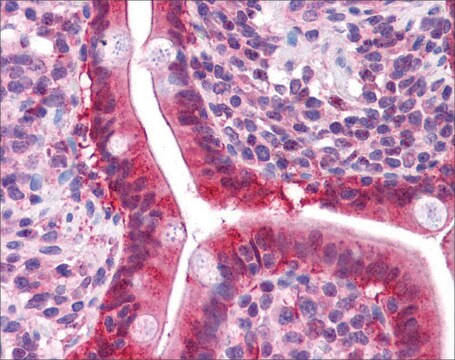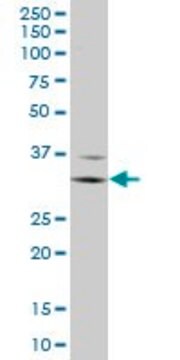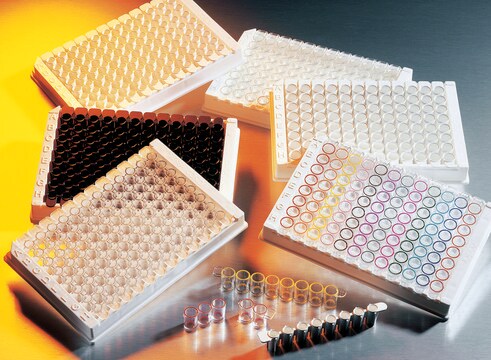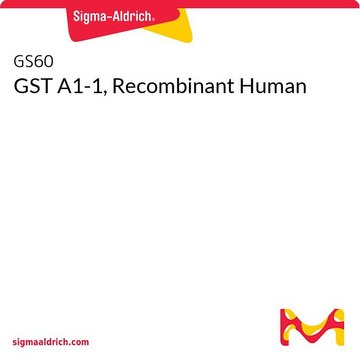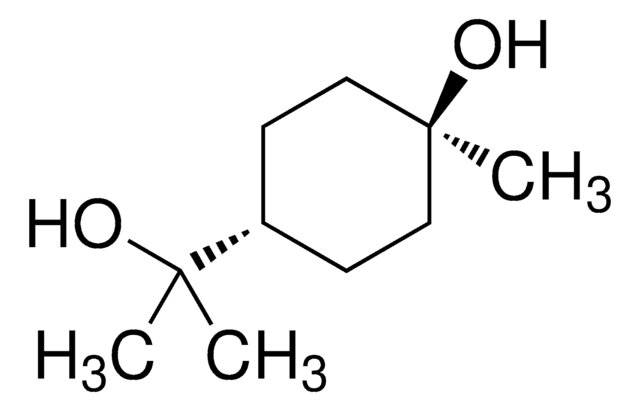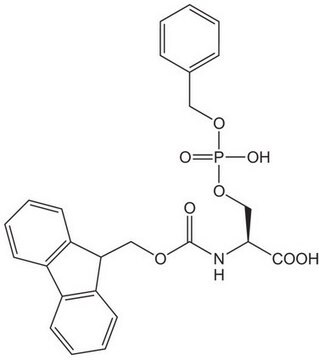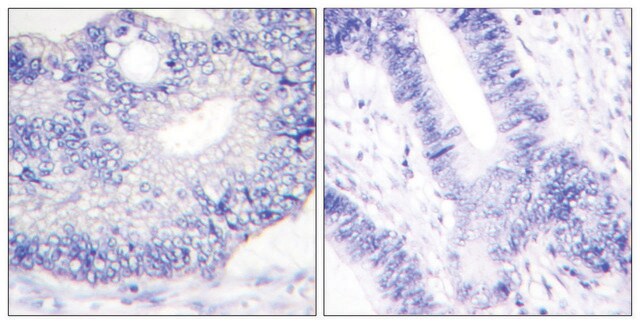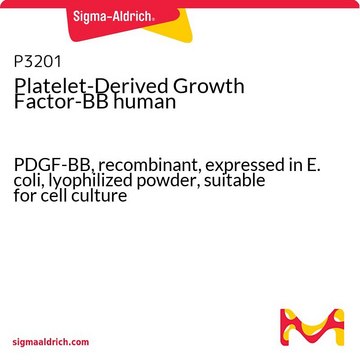推荐产品
生物源
rabbit
品質等級
抗體表格
serum
抗體產品種類
primary antibodies
無性繁殖
polyclonal
物種活性
rat, human, mouse
技術
immunohistochemistry: suitable (paraffin)
western blot: suitable
NCBI登錄號
UniProt登錄號
運輸包裝
dry ice
目標翻譯後修改
unmodified
基因資訊
human ... GSTT1(2952)
一般說明
Glutathione S-transferase theta-1 (EC 2.5.1.18; UniProt P30711; also known as Glutathione S-transferase T1-1, GST class-theta-1, GST T1-1) is encoded by the GSTT1 gene (Gene ID 2952) in human. Glutathione S-transferases constitute a family of metabolic isozymes that are involved in detoxification by catalyzing the conjugation of the reduced form of glutathione (GSH) to xenobiotic substrates. The GST family can be subdivided into the cytosolic, mitochondrial, and microsomal (a.k.a. MAPEG) proteins. Mammalian GSTs exist as either homodimers or heterodimers. The individual monomers were historically characterized by their quaternary structure and size, Yf (24.5 kDa), Yk (25 kDa), Ya1 (25.5 kDa), Ya2 (25.5 kDa), Yn (26.5 kDa), Yb1 (27 kDa), Yb2 (27 kDa) and Yc (28.5 kDa). The Y designation refers to the Y fraction (as apposed to the X and Z fractions) they were found in during purification by Sephadex G75 chromatography. Two GST superfamilies exist that comprise either cytosolic or membrane-bound proteins. Evidence suggests that cytosolic GST increases bodily resistance to carcinogens, products of oxidative stress, environmental pollutants and certain anti-cancer drugs. The cytosolic GSTs are further subdivided into eight classes. namely alpha (GSTA), mu (GSTM), pi (GSTP), sigma, theta (GSTT), kappa (GSTK), zeta (GSTZ), and omega (GSTO). GSTT1 exists as a homodimer, the subunit is referred to as subunit 5 in rat species, and T1-1 theta subunit in human.
特異性
Expected to react with both spliced isoforms reported by UniProt (P30711). Note that not all human samples are positive for GSTT1 expression. It has been estimated that approx. 18% of the Caucasian, and as much as 60% of the Chinese and Korean populations are GSTT1-null (Katoh, T., et al. (1996) Carcinogenesis. 17(9):1855-1859; Lear, J.T., et al. (1996) Carcinogenesis. 17(9):1891-1896;).
免疫原
His-tagged recombinant full-length human GSTT1.
應用
Anti-GSTT1 Antibody is an antibody against GSTT1 for use in Western Blotting, Immunohistochemistry (Paraffin).
Research Category
Signaling
Signaling
Research Sub Category
Oxidative Stress
Oxidative Stress
Western Blotting Analysis: A representative lot detected recombinant human and murine GSTT1, as well as endogenous GSTT1 in human and mouse liver samples (Sherratt, P.J., et al. (2002). Toxicol. Appl. Pharmacol. 179(2):89-97),
Western Blotting Analysis: A representative lot detected significantly upregulated GSTT1 levels in liver cytosolic preparations from rats on a selenium-deficient diet (McLeod, R., et al. (1997). Cancer Res. 57(19):4257-4266).
Western Blotting Analysis: A representative lot detected recombinant human GSTT1, as well as endogenous human GSTT1 in multiple tissue samples from four deseased individuals (Sherratt, P.J., et al. (1997). Biochem. J. 326 (Pt 3):837-846).
Immunohistochemistry Analysis: A representative lot detected differential GSTT1 immunoreactivity among liver cells in formalin-fixed, paraffin-embedded human and mouse liver tissue sections (Sherratt, P.J., et al. (2002). Toxicol. Appl. Pharmacol. 179(2):89-97).
Western Blotting Analysis: A representative lot detected significantly upregulated GSTT1 levels in liver cytosolic preparations from rats on a selenium-deficient diet (McLeod, R., et al. (1997). Cancer Res. 57(19):4257-4266).
Western Blotting Analysis: A representative lot detected recombinant human GSTT1, as well as endogenous human GSTT1 in multiple tissue samples from four deseased individuals (Sherratt, P.J., et al. (1997). Biochem. J. 326 (Pt 3):837-846).
Immunohistochemistry Analysis: A representative lot detected differential GSTT1 immunoreactivity among liver cells in formalin-fixed, paraffin-embedded human and mouse liver tissue sections (Sherratt, P.J., et al. (2002). Toxicol. Appl. Pharmacol. 179(2):89-97).
品質
Evaluated by Western Blotting in human liver tissue lysate.
Western Blotting Analysis: A 1:5,000 dilution of this antibody detected glutathione S-transferase theta-1 (GSTT1) in 10 µg of human liver tissue lysate.
Western Blotting Analysis: A 1:5,000 dilution of this antibody detected glutathione S-transferase theta-1 (GSTT1) in 10 µg of human liver tissue lysate.
標靶描述
~27 kDa observed (monomer). 27.3 kDa (isoform 1) and 13.5 kDa (isoform 2) calculated.
外觀
Unpurified
Rabbit polyclonal antibody in serum with 0.05% sodium azide.
儲存和穩定性
Stable for 1 year at -20°C from date of receipt.
Handling Recommendations: Upon receipt and prior to removing the cap, centrifuge the vial and gently mix the solution. Aliquot into microcentrifuge tubes and store at -20°C. Avoid repeated freeze/thaw cycles, which may damage IgG and affect product performance.
Handling Recommendations: Upon receipt and prior to removing the cap, centrifuge the vial and gently mix the solution. Aliquot into microcentrifuge tubes and store at -20°C. Avoid repeated freeze/thaw cycles, which may damage IgG and affect product performance.
其他說明
Concentration: Please refer to lot specific datasheet.
免責聲明
Unless otherwise stated in our catalog or other company documentation accompanying the product(s), our products are intended for research use only and are not to be used for any other purpose, which includes but is not limited to, unauthorized commercial uses, in vitro diagnostic uses, ex vivo or in vivo therapeutic uses or any type of consumption or application to humans or animals.
未找到合适的产品?
试试我们的产品选型工具.
儲存類別代碼
12 - Non Combustible Liquids
水污染物質分類(WGK)
WGK 1
閃點(°F)
Not applicable
閃點(°C)
Not applicable
Philip J Sherratt et al.
Toxicology and applied pharmacology, 179(2), 89-97 (2002-03-09)
Dichloromethane (DCM) is a hepatic and pulmonary carcinogen in mice exposed to high doses by inhalation. It has been shown previously that the incidence of liver and lung tumors does not increase in rats or hamsters exposed to the dihaloalkane
P J Sherratt et al.
The Biochemical journal, 326 ( Pt 3), 837-846 (1997-10-23)
The cDNA encoding human glutathione S-transferase (GST) T1 has been expressed as two recombinant forms in Escherichia coli that could be purified by affinity chromatography on either IgG-Sepharose or nickel-agarose; one form of the transferase was synthesized from the pALP
R McLeod et al.
Cancer research, 57(19), 4257-4266 (1997-10-23)
Fischer 344 rats fed on a diet that is deficient in selenium are more resistant to the hepatocarcinogen aflatoxin B1 (AFB1) than those fed on a selenium-sufficient diet. Hepatic cytosol from either selenium-deficient Fischer 344 rats or Hooded Lister rats
Amanda Degner et al.
Chemical research in toxicology, 33(7), 1698-1708 (2020-04-03)
Smoking-induced lung cancer is a major cause of cancer mortality in the US and worldwide. While 11-24% of smokers will develop lung cancer, risk varies among individuals and ethnic/racial groups. Specifically, African American and Native Hawaiian cigarette smokers are more
我们的科学家团队拥有各种研究领域经验,包括生命科学、材料科学、化学合成、色谱、分析及许多其他领域.
联系技术服务部门